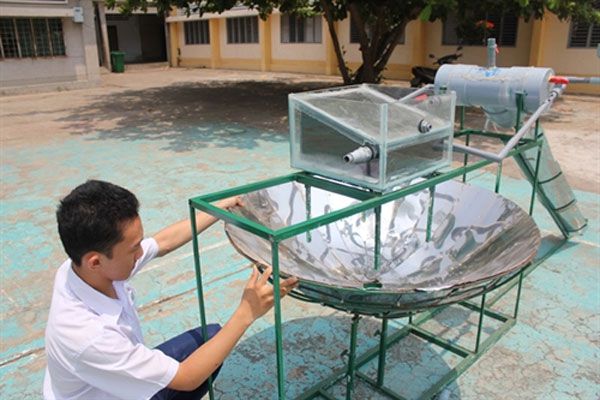Homemade Machine for Purifying Salt Water
Published on by Water Network Research, Official research team of The Water Network in Technology
Homemade desalination device is created by a teacher and a group of students from Nguyen Dinh Chieu High School, Vietnam, to give locals access to drinking water.
 Seasalt water intrusion, which started earlier this year, has polluted clean water sources causing difficulties for residents.
Seasalt water intrusion, which started earlier this year, has polluted clean water sources causing difficulties for residents.
Faced with this urgent situation, physics teacher Truong Huu Dung thought of creating a device to turn salt water into drinking water that’s ready to use for local people.
“Once in 2013, I visited my student’s home in Thanh Phu District where the drought had been ongoing for six months,” said Dung.
“We know people suffer so much hardship due to lack of fresh water. The idea of the device flashed into our minds since then.”
Teacher Dung and his students Ho Ngoc Kien Uyen and Nguyen Thanh Dat started work on making a solar desalting system.
The first version was so modest that it included a clay pot containing saltwater, a stainless steel parabol dish to collect sunlight and an insulation device. The collected steam, or pure water vapour, condenses and turns into fresh water.
However, the initial system had many disadvantages. The amount of fresh water collected was too little and it took a long time to transform it.
“The first version was successful in terms of the idea. We knew that we were walking in the right direction, we just needed to improve it,” said Dung.
Then Uyen and Dat moved to HCM City to study in university, so the project was interrupted.
Last year, thousands of people in Ben Tre had to buy fresh water to drink at high prices. Nguyen Dinh Chieu High School also couldn’t provide drinking water for its students. A fresh water filter was so expensive (VND60 million, US$3,000) that the school couldn’t afford one.
Dung was encouraged to continue his research. He was joined by a 17-year-old student Nguyen Tan Loi from Chau Thanh District, a region that suffers seriously from drought and water intrusion.
They only started in May last year, but by early this year a second version of the system was completed.
“This desalination system can provide four litres of fresh water a day. The drops of water are so precious to us, we are all happy that we have come closer to success,” said Loi.
They have experienced many failures and overcome numerous difficulties during the process. The salt water gradually eroded the container and pipes. The device didn’t work in cloudy weather because the sunlight wasn’t enough to run the system. At one point the water boiled leading to a sudden build up in pressure, and the container exploded.
A third version of the system can produce six litres of fresh water a day, an amount enough for a family of three.
Teacher Dung and his student Loi are working on a new version that can provide 30 litres of water a day. The cost to produce the machine is estimated at VND1 million.
“We are targeting people with low incomes. We believe that at this price, many people will have a chance to make their own fresh water,” said Loi.
“I’m so happy that the device works. I will continue researching with teacher Dung to develop it. One day, I will make one for my family.”
To mass produce this device they will need support from enterprises. They still dream that one day their invention can improve the lives of locals.
“Who owns the invention doesn’t matter. We can transfer the idea of the desalination system to enterprises to bring a better life to people,” said teacher Dung.
Dang Buu Truyen, headmaster of the Nguyen Dinh Chieu High School, said scientific research is paid close attention to at the school. The research and inventions of many teachers and students have won awards in the province.
“I highly appreciate the research of Dung and his students,” said Truyen.
“The idea is very practical and can be applied to the real life of local people. The problem drought and seawater intrusion is very urgent now in Ben Tre Province in particular and the Mekong Delta provinces in general.”
“We encourage students to research and that helps them improve their thinking and creative capacity. In the near future, we will equip the laboratory with more facilities to create better conditions for the students.”
Induced by the El Niño phenomenon, the drought in the South Central Coast and Central Highlands provinces has led to serious groundwater depletion in several water-scarce districts. The Mekong Delta provinces are facing saline water intrusion as the result of low water levels in the Mekong River.
In some coastal areas, salt water intrusion now reaches up to 90km inland, making local water unfit for drinking, bathing, irrigation and farming, according to the National Centre for Hydro-Meteorological Forecasting.
Ben Tre is one of the provinces most seriously affected. The provincial authority said that some localities are seriously suffering, with between 70 and 100 per cent of local fields contaminated by salt.
Source: Vietnam News
Media
Taxonomy
- Technology
- Desalination
- Drinking Water
- Desalination
2 Comments
-
Une serre ou tunnel peut produire de l'eau douce sur les côtés ou celle salée au milieu en canal , on peut faire de l'élevage de poisson et du végétal
-
Excellent